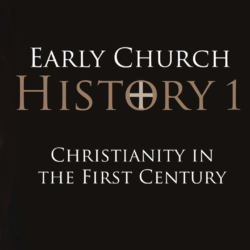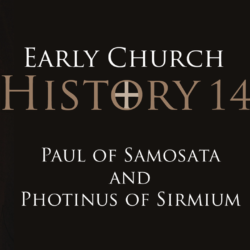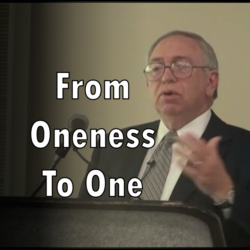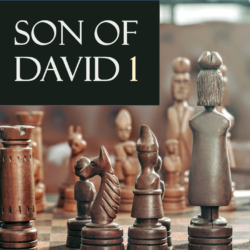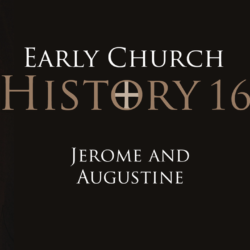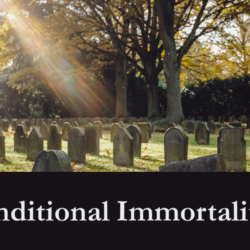Learn about the dissident groups in Britain in the 17th and 18th centuries, including the Puritans, Baptists, Quakers, and Unitarians. In addition, Sean Kelly presents a vignette of John Biddle’s life and influence.
This is lecture 10 of a history of Christianity class called Five Hundred: From Martin Luther to Joel Osteen.
All the notes are available here as a pdf.
—— Notes ——
Puritans
- Robert Browne (1550-1633)
- Treatise of Reformation without Tarrying for Any, and of the Wickedness of those Preachers which will not Reform…till the Magistrate Command and Compel Them
- Reformation needed to take place whether or not the king wanted it or not
- Congressionalist rather than Presbyterian
- A group of Dutch Brownists were the ones who came to the New World in 1620s
English Baptists
- Not related to continental Anabaptists
- Founded by John Smyth in 1609, an Englishman from Cambridge who fled to Amsterdam
- General [Arminian] vs. Particular [Calvinist] are two types of Baptists
- Reject role of the state in matters of conscience (church should be independent of the state)
- John Bunyan (1628-88), Grace Abounding to the Chief of Sinners (1666)
- Wrote autobiography Grace Abounding to Chief of Sinners
- Pilgrim’s Progress (1678), second part appeared in 1684
- Roger Williams (1603?-1683) brought Baptist faith to America
Quakers (“Society of Friends”)
- Founded by George Fox (1624-1691)
- “Inner Light” written in 1647: The word of God is not confined to the Bible but rather came directly to each person (inner light or inner voice)
- He rejected social distinctions, allowed women to preach
- Pacifists and egalitarians (worked against slavery in the US using underground railway)
- No sacraments at all b/c they were physical
- Total silence during meetings until someone is inspired to speak
British Unitarians
- John Biddle (1615-1662), the father of English Unitarianism
- brilliant man
- 1634 his anthology he published his translations from classics into English
- at university he “outran his instructors and became tutor to himself” (Protesters, 131)
- 1634 he went to Magdalen Hall at Oxford
- 1641 he was headmaster of the Crypt Grammar School in Gloucester
- immersed himself in Scripture for years
- knew entire NT by heart in English and most in Greek, though about Rev. 4 his memory got fuzzy
- claimed he never read Socinian literature before coming to his own opinions
- wrote a pamphlet, Twelve Arguments against the Deity of the Holy Spirit
- 1646 summoned to London’s parliament and imprisoned for 5 years
- 1648 Publishes two anti-Trinitarian documents
- A Confession of Faith Toughing the Holy Trinity According to Scripture
- The Testimonies of Irenaeus, Justin Martyr, Tertullian, Novatianus, Theophilus, Origen. As Also of Arnobius, Lactanius, Easebius, Hilary and Brightman Concerning the One God and the Persons of the Holy Trinity
- 1652 Biddle released and remained in London where he found fellowship
- 1654 Biddle published his Twofold Catechism
- when Oliver Cromwell got in power Biddle was released
- returned to quiet active work in a church
- two months later he was imprisoned in Newgate prison
- remained at St Mary’s for 3 years
- enjoyed 4 years of freedom and wrote to Polish brethren who had just been exiled
- 1662 arrested again, contracted jail fever and died
- Sep 22, 1662 Dies-Age 47
- brilliant man
- 1658 – Polish Brethren kicked out by King Casimir
- 1665-8 – Library of the Polish Brethren Called Unitarians published in Amsterdam, Holland
- Written in Latin so educated English people could read it
- Daniel Zwicker (1612-1678)
- 1658 – published Irenicum Irenicorum, an examination of Christian theology before the Nicene Creed, concluding that Christ’s divinity was the invention of early heretics
- George Bull (1634-1710) refuted him in his Primitive and Apostolic Tradition
- The Socinian Controversy (1687-1702)
- Lots of anonymous pamphlet literature
- 1687 (25 years after Biddle’s death), Stephen Nye (1648-1719) published Brief History of the Unitarians also called Socinians anonymously
- “The crucial question in the controversy was as to what is meant by one God in three When the Unitarians urged that this belief by its own words contradicts itself, some tried to remove the difficulty by explaining that persons means just what we usually mean by the word; but the Unitarians replied that this involves belief in three separate Gods.Others sought to show that persons has here a special meaning and simply means three different modes of being or acting; but it was replied that this was the ancient heresy of Sabellianism and that Christ means something more than merely God’s mode of acting. So the controversy went on, with the Unitarians ever keen to detect any flaw in the reasoning of the orthodox, and ready to press every advantage against them. The controversy ended, the acute stage of it at least, when the authorities of the Church at least seemed to accept an explanation of the Trinity to which the Unitarians could assent with good conscience.”[1]
- 1689 – Act of Toleration excluded anti-Trinitarian beliefs
- 1690 – Arthur Bury (1624-1714?) wrote The Naked Gospel
- arguing that we need to free the gospel from latter corruptions
- 1693 William Freke (1662-1744) wrote Brief but Clear Confutation of the Doctrine of the Trinity and sent it to both houses of Parliament
- 1695 -John Smith (1647-1727?) A designed End to the Socinian Controversy: or a rational and plain Discourse that no other person but the Father of Christ is God Most High
- 1695 – Gilbert Clerke (1626-1697?) Tractatus tres; quorum qui prior Ante-Nicenismus dicitur (trans.? Third Tract about Those Who Spoke before Nicea)
- 1695 – John Locke (1632-1704) The Reasonableness of Christianity
- Anyone who admitted the messiahship of Jesus should be considered a Christian
- Convinced Newton to write his most powerful anti-Trinitarian tract (though it was never published)
- 1697 – Blasphemy Act confirmed religious intolerance to Unitarians
- No holding public office, on second offence: no civil rights, imprisoned 3 years
- 1812 – The Trinitarian Act gave toleration for Unitarian worship
- 1967 – Blasphemy Act finally repealed
- 1702 – Thomas Emlyn (1663-1741) An Humble Inquiry into the Scripture Account of Jesus Christ, published anonymously
- Isaac Newton (1642-1727)
- Stayed in the closet about his Unitarian beliefs
- Had 8 Socinian books in his library
- Wrote a book against the corruption of 1 John 5:7
- William Whiston (1667-1752)
- Newton’s pupil who popularized his ideas
- Translated Josephus’ Antiquities of the Jews
- 1710 – Unitarian beliefs got him expelled from university
- Samuel Clarke (1675-1729)
- Philosopher (major figure between Locke and Berkeley)
- 1712 – The Scripture Doctrine of the Trinity
- Part 1: exegesis of NT texts related to the Trinity
- Part 2: doctrine explained as a set of propositions
- Part 3: C of E’s liturgy examined
- In all, he referred to 1251 biblical texts
- 1719 – debate at Salters’ Hall in London over subscribing to a confession
- Involved Presbyterians, Independents, and Baptists
- “While Trinitarians were found on both sides, the result of the debate was that by the end of the century, the great majority of English Presbyterian congregations along with most General Baptists became Unitarian.”[2]
- 1773 – Theophilus Lindsey (1723-1808) founds first Unitarian congregation at Essex Street Chapel in London
[1] Earl Morse Wilbur, Our Unitarian Heritage, p. 198 (available online: http://www.miguelservet.org/enlared/our_unitarian_heritage.pdf)
[2] Tim Grass, p. 69.
—— Links ——
- See all the episodes of Five Hundred: From Martin Luther to Joel Osteen.
- The three main textbooks for this class include:
- The European Reformations by Carter Lindberg
- The Radical Reformation by George Williams
- Modern Church History by Tim Grass
- Check out these other Restitutio historical podcasts
- Intro music: “District Four” by Kevin MacLeod. Licensed under Creative Commons: By Attribution 3.0 License.

